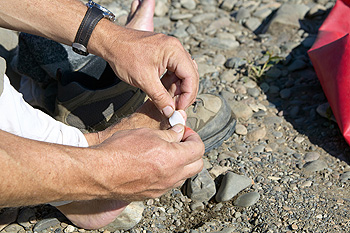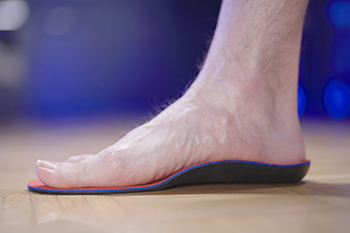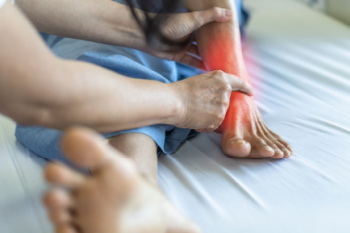Connect With Us
Blog

Blisters between the toes can be painful and uncomfortable, often causing irritation with every step. The primary symptom is a fluid-filled bump that forms between the toes, which may be red, swollen, or tender to the touch. Blisters are typically caused by friction, such as from wearing poorly fitted shoes or excessive moisture. Activities like running or dancing can also increase the risk of developing blisters in this sensitive area. The friction can lead to a burning or stinging sensation, especially when pressure is applied. Popping a blister yourself is not recommended, as it can lead to infection. A podiatrist can help by properly draining any painful blisters and providing advice on prevention, including recommending the right footwear, moisture-wicking socks, or custom orthotics. This type of doctor may also offer guidance on how to care for the area to avoid infection and encourage faster healing. If you have developed blisters between the toes, it is suggested that you schedule an appointment with a podiatrist.
Blisters are prone to making everyday activities extremely uncomfortable. If your feet are hurting, contact one of our podiatrists of Advanced Foot & Ankle. Our doctors can provide the care you need to keep you pain-free and on your feet.
Foot Blisters
Foot blisters develop as a result of constantly wearing tight or ill-fitting footwear. This happens due to the constant rubbing from the shoe, which can often lead to pain.
What Are Foot Blisters?
A foot blister is a small fluid-filled pocket that forms on the upper-most layer of the skin. Blisters are filled with clear fluid and can lead to blood drainage or pus if the area becomes infected.
How Do Blisters Form?
Blisters on the feet are often the result of constant friction of skin and material, usually by shoe rubbing. Walking in sandals, boots, or shoes that don’t fit properly for long periods of time can result in a blister. Having consistent foot moisture and humidity can easily lead to blister formation.
Prevention & Treatment
It is important to properly care for the affected area in order to prevent infection and ease the pain. Do not lance the blister and use a Band-Aid to provide pain relief. Also, be sure to keep your feet dry and wear proper fitting shoes. If you see blood or pus in a blister, seek assistance from a podiatrist.
If you have any questions, please feel free to contact our offices located in Newburg and Taylorsville, KY . We offer the newest diagnostic and treatment technologies for all your foot care needs.

Think of foot orthotics as custom-built shock absorbers for your feet, designed to realign, cushion, and enhance every step. More than just insoles, they serve as personalized tools that adapt to the way you walk, helping to correct imbalances, reduce pain, and prevent long-term issues. Whether you are dealing with heel pain, arthritis, or just tired, achy feet, orthotics work behind the scenes to distribute pressure evenly, absorb impact, and improve posture. They can even help with knee, hip, and lower back pain by addressing misalignment at the foundation. Not all orthotics are created equal, and what works for one person might not work for another. It is suggested that you schedule an appointment with a podiatrist who can assess your needs and recommend the best option, ensuring the right fit for comfort, support, and long-term foot health.
If you are having discomfort in your feet and would like to try orthotics, contact one of our podiatrists from Advanced Foot & Ankle. Our doctors can provide the care you need to keep you pain-free and on your feet.
What Are Orthotics?
Orthotics are inserts you can place into your shoes to help with a variety of foot problems such as flat feet or foot pain. Orthotics provide relief and comfort for minor foot and heel pain but can’t correct serious biomechanical problems in your feet.
Over-the-Counter Inserts
Orthotics come in a wide variety of over-the-counter inserts that are used to treat foot pain, heel pain, and minor problems. For example, arch supports can be inserted into your shoes to help correct overarched or flat feet, while gel insoles are often used because they provide comfort and relief from foot and heel pain by alleviating pressure.
Prescription Orthotics
If over-the-counter inserts don’t work for you or if you have a more severe foot concern, it is possible to have your podiatrist prescribe custom orthotics. These high-quality inserts are designed to treat problems such as abnormal motion, plantar fasciitis, and severe forms of heel pain. They can even be used to help patients suffering from diabetes by treating foot ulcers and painful calluses and are usually molded to your feet individually, which allows them to provide full support and comfort.
If you are experiencing minor to severe foot or heel pain, it’s recommended to speak with your podiatrist about the possibilities of using orthotics. A podiatrist can determine which type of orthotic is right for you and allow you to take the first steps towards being pain-free.
If you have any questions please contact our offices located in Newburg and Taylorsville, KY . We offer the newest diagnostic and treatment technologies for all your foot and ankle needs.

Tarsal tunnel syndrome is a condition caused by compression of the tibial nerve as it passes through the tarsal tunnel, a narrow space inside the ankle. This compression leads to pain, tingling, numbness, or burning sensations in the foot and ankle. The condition can result from injuries, swelling, varicose veins, or underlying conditions such as arthritis or diabetes. Risk factors include repetitive stress, flat feet, high-impact activities, and prolonged standing. Symptoms may worsen with movement and improve with rest. Individuals often experience discomfort along the inner ankle that radiates to the toes. Weakness in the foot muscles can also occur in severe cases. If you have any of the above symptoms, it is suggested that you consult a podiatrist who can accurately diagnose and treat tarsal tunnel syndrome.
Tarsal tunnel syndrome can be very uncomfortable to live with. If you are experiencing tarsal tunnel syndrome, contact one of our podiatrists of Advanced Foot & Ankle. Our doctors can provide the care you need to keep you pain-free and on your feet.
Tarsal Tunnel Syndrome
Tarsal tunnel syndrome, which can also be called tibial nerve dysfunction, is an uncommon condition of misfiring peripheral nerves in the foot. The tibial nerve is the peripheral nerve in the leg responsible for sensation and movement of the foot and calf muscles. In tarsal tunnel syndrome, the tibial nerve is damaged, causing problems with movement and feeling in the foot of the affected leg.
Common Cause of Tarsal Tunnel Syndrome
- Involves pressure or an injury, direct pressure on the tibial nerve for an extended period of time, sometimes caused by other body structures close by or near the knee.
- Diseases that damage nerves, including diabetes, may cause tarsal tunnel syndrome.
- At times, tarsal tunnel syndrome can appear without an obvious cause in some cases.
The Effects of Tarsal Tunnel Syndrome
- Different sensations, an afflicted person may experience pain, tingling, burning or other unusual sensations in the foot of the affected leg.
- The foot muscles, toes and ankle become weaker, and curling your toes or flexing your foot can become difficult.
- If condition worsens, infections and ulcers may develop on the foot that is experiencing the syndrome.
A physical exam of the leg can help identify the presence of tarsal tunnel syndrome. Medical tests, such as a nerve biopsy, are also used to diagnose the condition. Patients may receive physical therapy and prescriptive medication. In extreme cases, some may require surgery.
If you have any questions please feel free to contact our offices located in Newburg and Taylorsville, KY . We offer the newest diagnostic and treatment technologies for all your foot and ankle needs.

